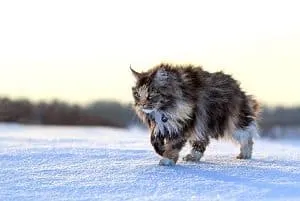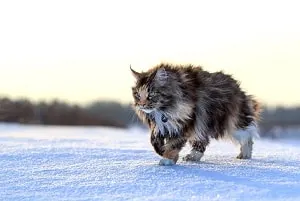 The best part of winter is when your Maine Coon starts to cuddle you more. Getting the extra love is enough to warm up from even the harshest snowstorms. That being said, it might not be because your cat wants to spend more time with you, it’s more likely they are cold, and you are a big warm heater. Cat’s don’t really like the winter! But, do large cats such as the Maine Coon like snow?
The best part of winter is when your Maine Coon starts to cuddle you more. Getting the extra love is enough to warm up from even the harshest snowstorms. That being said, it might not be because your cat wants to spend more time with you, it’s more likely they are cold, and you are a big warm heater. Cat’s don’t really like the winter! But, do large cats such as the Maine Coon like snow?
Maine Coons are more tolerable to snow than most other cats. It’s up to your cat’s personality if they like the snow or not. Cats are also more sensitive to the cold than people. Temperatures below 45 degrees are too cold for most cats.
Cats are masters at hiding their physical symptoms, but there are ways to tell if your cat is too cold or if they can be outside during the winter.
How Do I Know If My Cat Is Cold?
We think that animals are more tolerant of cold because of their furry exteriors, but this isn’t the case. Most times, people don’t consider what the body temperature of their cat should be.
Humans are anywhere between 97 degrees to 99 degrees. Cats tend to have a higher base temperature that is anywhere from 100 to 102 degrees.
While this might not seem like a dramatic difference, it makes a massive impact on how we feel temperature versus how a cat feels temperature. Cats are going to be more sensitive to the cold because their base temperature is warm. You can assume that if it is cold to you, it is cold for your cat. Anything below 99 can be dangerous.
Cats don’t like showing their weakness to cold, so it’s crucial that you know the warning signs of a cold cat.
● Their ears, tail, or paws are cold- these will lose heat first. Just like humans, the extremities cool off first to protect the inner organs.
● Always sleeping in a ball shape- some cats are just comfortable like this, but if it is cold out and they are always sleeping like this, it could mean they’re a touch too cold.
● Super snuggly- sad to think our kitty is super snuggly because they’re cold. Cat’s are pretty independent, so snuggling isn’t always a sweet token of love.
Hypothermia in Cats
All animals are at risk for hypothermia. Since cats have a higher body temperature, it makes sense that they start to get hypothermia sooner than humans. Acute hypothermia begins at 99 degrees.
At this point, cats start to shiver and seem a little sluggish. As the temperature drops, the symptoms get worse. Cats can get muscle stiffness, dilated pupils, difficulty breathing, and become unresponsive. A cat can die because of the cold. If any of these are present, get to a vet immediately.
Maine Coons are a bit more resilient to the cold. Their coats are insulated and thick, keeping out moderately cold temperatures. Their coats are also glossy, which helps repel water and snow.
Even their paws are built to withstand the colder temperatures; thick tufts of fur and wide-set toes act as snowshoes. That being said, Maine Coons can still get cold, they just have a better defense. It’s still important to be aware of the signs that point to a cold kitty.
Can Cats Live Outside During The Winter
There are quite a few variables to consider. First, where do you live, and what is the climate like? Winter in Arizona is much different than winter in New York. If there are more snow and lower temperatures, then it is recommended to keep your cat inside.
Another thing to consider is the type of cat. As mentioned earlier, Maine Coons are a lot more resilient to the cold than most other cats, but a Sphynx cat is going to be much more sensitive to the cold and should not be left outside. Also, think about the personality of your cat. Do you think they would like to be in the snow? Some cats, like Maine Coons, are going to have a blast. Other cats might just get cranky.
Finally, strays, feral cats, and housecats have dramatically different opinions on being outside in the cold. It’s not a stretch to say that we spoil our housecats with heaters, warm laptops, and comfy blankets. Stray cats are a lot tougher, so they will be able to find resources to stay safe and warm that your housecat might not be able to.
In general, it is not safe for your housecat to live outside during the wintertime. If you see a stray or feral cat, they can probably take care of themselves.
Maine Coons and Snow
Even though no one knows the exact origins of the Maine Coon, it is accepted that they are from Maine. In Maine, the winters are harsh, with an average temperature of 12 degrees. Natural selection took over here and gifted Maine Coons with the ability to survive harsher winters. With 12 degrees as the average, it’s easy to see why Maine Coons developed as they did.
The biggest advantage a Maine Coon has over other cat breeds is their paws. Wide paws make it easy for Maine Coons to walk on snow without sinking in. Other, smaller, cats such as the Singapura, would not be able to do this because of their smaller paws and size.
Because of this and other dog-like qualities, a Maine Coon has, these cats are much more adventurous. They’re more likely to enjoy the snow, but it all depends on your cat’s personality.
Do Cats Need Sweaters To Stay Warm
It might be very adorable to put your cat in a sweater, but it’s unnecessary for Maine Coons and most other breeds.
Note that it only most cats who don’t need sweaters. Maine Coons and other long-haired cats don’t need to have a sweater because their coats are a lot thicker and insulated. However, if you have a cat that is hairless or very short-haired, a sweater can be beneficial to them, especially during the wintertime. It is recommended that hairless cats have sweaters. On the other hand, long-haired cats might get too hot in a sweater.
If your cat is going to be outside, it might not be suitable to wear a sweater at all. If snow melts on the sweater, it can decrease the body temperature of the cat because the cold water is pressing up against the cat for a prolonged period of time. This idea is also true for a cat who likes to eat snow, just like when humans drink something cold, the body temperature decreases. Remember, cats begin getting hypothermia at only 99 degrees!
Conclusion
Cats don’t like it when people know they aren’t comfortable. But when it comes to the cold, it is essential to understand what a cold cat looks like and what the risks are. Acute hypothermia sets in at only 99 degrees because cats have a much higher temperature than humans. It is safe to assume that if you’re cold, so is your fur baby.
Maine Coons are tougher than most other breeds of cats so that they can tolerate the cold a lot more. This doesn’t necessarily mean that they should be left outside during the winter; it just means that they can last longer than other cat breeds. Maine Coons have developed wide paws and insulated coats for snowy weather. Maine Coons are probably one of the only breeds of cats that enjoy the snow!
When it comes to the cold, your cat might be using you for the extra warmth, but the extra snuggles are nice. Enjoy them, and keep your cat safe and warm.

My name is James, and welcome to FAQCats!
Along with our team of cat owners, expert pet enthusiasts, and pet professionals, we aim to write engaging helpful, engaging content about cats. At FAQCats we strive to provide content that’s accurate and fun to read. Our team writes about everything related to cats; even the most complex of topics. Through extensive research and caring for our own fur-pals, we’re able to provide something cat owners worldwide will love. Have a look around, and leave us feedback anytime!

